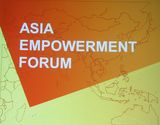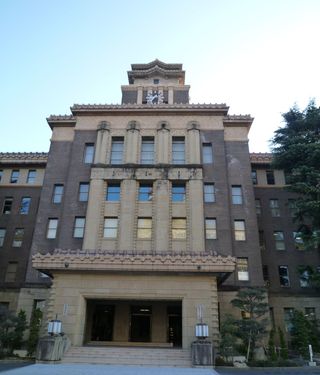Students are chosen as regional committee representatives
- 2011/01/27 11:11

A Japan-first! Two university students are chosen as regional committee representatives
Regional committees were conceived from the idea of finding new forms of local administration, centering on volunteer-participation. So what do they do?


Nagoya University journalism student Lance Truong spoke with Shingo Tamaki (a fourth-year student at Nagoya University), and Koujiro Ohara (a third-year student at Aichi Prefectural University). They were elected to serve as representatives in the regional committee for Chikusa Ward in Nagoya, where they deliberated over how to allocate their fifteen million yen (around 180 thousand USD) budget.
.jpg)
Regional committees began on a trial-basis in Nagoya. In this system of regional self-government, committee members are elected to according to school districts, which have a population of 5000 to 15000 people. While all members are volunteers, with their budget of five to fifteen million yen and task of promoting discussions as representatives of local residents, they are vastly different to existing residents’ associations and regional liaisons. Despite accusations of being a ‘dead letter local assembly’, all regional committee meetings are open to the public, with normal citizens able to freely participate and ask questions – a new form of local self-government.

(Left: Tamaki, right: Ohara)
Q: Why did you decide to run to become a volunteer committee member?
A: (Tamaki) I came to Nagoya from Wakayama, and in my life as a student I didn’t have much involvement with my community, so I though it would be a good opportunity to learn about it. I also felt it would be a challenge to decide by ourselves how to spend a fifteen million yen budget, so I decided to run.
A: (Ohara) I study Spanish and have an interest in the influence (Spanish architect Antoni) Gaudi’s buildings had on the cities they were built in. I found our regional committee’s task, the‘preservation of historical buildings’, very attractive, so I ran.
Q: What did you feel in your experience as a regional committee member?
.jpg)
A: (Tamaki) While I also served as committee vice-chairman, there were not many other young committee members. However, I was surrounded by many people with rich life experience, from seniors to housewives, and they really listened to our opinions. I learnt that the ability of students to provide new ideas and put them into action can be useful for the local community. While there are many young people who show no interest in politics and don’t vote, if you can have an interest in your community, you can become responsible for how your society changes into the future.
In my family there are many police and public servants. I also served as student body president, so I guess I was always relatively surrounded by politics and social issues. Being able to take responsibility on deciding how to spend fifteen million yen of peoples’ taxes however was a really good experience – I keenly felt the weight of that responsibility. I learnt that in terms of your own community, there are many problems close at hand, and young people are able to contribute in areas like mobilizing help and doing the planning for events. I also think that my being chosen as committee vice-chairman reflected the large expectations of the other committee members towards the younger generation. Originally, politics shouldn’t be carried out by “special” people; there should be more roles for younger people, salarymen, housewives, representatives for the weaker in society, and others. Working this time as a community representative, I keenly felt the large expectations towards my generation. Also, to make the regional committees function better, I think we need the cooperation of city councilors. In order to listen to the voices of local residents, if city councilors can both accept and work with the volunteer regional committees, I think local governance will become more democratic, and the number of young people participating in politics will increase. In order to answer those expectations, I want to continue studying about politics and local governance.

A: (Ohara) Firstly, because I ran without any big expectations, I was honestly surprised when I got elected. Talking with other members in the committee meetings, I was able to learn about aspects of society that you can’t learn about in university. I was impressed by the committee chairman’s ability to coordinate such discussions while listening to everybody’s opinions. Working with a large budget and debating about the community I live in allowed me to appreciate again how great it is. When I told my friends at university about my activities as a regional committee representative, many of them showed an interest. The students at my university, majoring in foreign languages and other international-related subjects, tend to focus on larger world issues. I thought however that if people can become interested in their own community, this could also lead to solving those world issues.
Also, while I had studied about how Gaudi’s architecture influenced the formation of cities, by learning about and taking pride in the historical buildings of my own town, I developed an attachment to my community. I was also very happy when my university friends volunteered to help out at regional committee events. If even just one student gets involved with the people living in his community and develops an interest in it, I think this is a good thing. While I plan to study overseas in the future, through my work in the regional committee I was able to rediscover the importance of community ties and the wonder of Japan, and felt I have become able to talk about myself as a Japanese person.
Many local politicians in other democratic countries have another principal occupation; the volunteer aspect of their work (as local members) is strong. In this case, there aren’t many professional members of parliament (MPs) like in Japan. This trial of regional committees in Nagoya aims in the future to bring parliaments - which becoming more entrenched with professional MPs - closer to ordinary citizens. These two students, through their first experience in a regional committee, seem to have felt they have answered what was expected of them. This year there are unified local elections. It is important for young people themselves to carve out a new age, rather than leave their future to others. If they continue to act with this in mind, the adults of good will around them will give their support.
Chairman of the Tashiro School District Regional Committee and leader who supported the two students, Mr. Sato

Mr. Sato is a prominent member of the community who has contributed to it for many years through his activities in regional liaisons and residents’ associations. He says, ‘In my region, from students to housewives, many different people participated (in the regional committee). However, the (two) students gave a lot of ideas and really livened up our meetings. In our events their friends also volunteered to help out and liven up proceedings. I’ve been involved in community activities for many years, but with many of our members aging, if we are able to work with a large budget like the regional committee, we should be able to attract young people’s interest as well. In terms of local governance, their ability to come up with ideas and carry them through is also needed.’

Balance Sheet Recession:
Japan’s Struggle with Unchartered Economics
and its Global Implications’
Richard Koo (author), Kouichi Nirei (translation)
Is Japan really a ‘debt superpower’?
How about reducing tax to spur private economic activity?
Most Japanese government bonds are held by Japanese people or companies.
Despite this, why are they so pessimistic about the future?
One of the world’s top analysts explains these generally perceived ‘blind spots’ in economics in an easy-to-understand way. Find out all the answers in this book!

